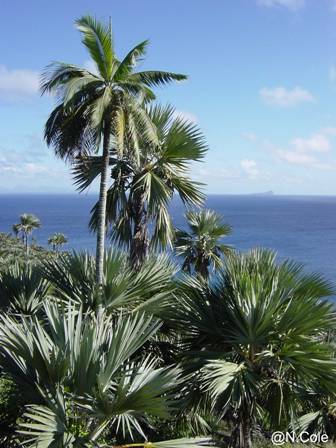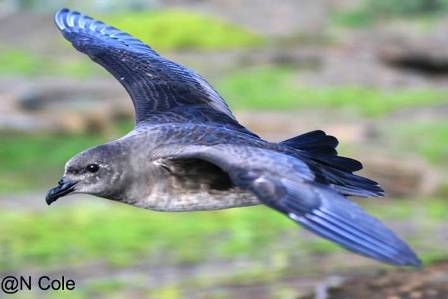|
Flora and Fauna
Round Island supports the last remnant of a lowland palm rich community that formerly covered the dry lowland areas of Mauritius. The palm community is made up of several species of palms that are endemic to Mauritius. The hurricane palm, Dictyosperma album var. conjugatum, is Critically Endangered with only one surviving wild individual on Round Island. The Round Island bottle palm is also restricted to Round Island and is now regenerating well on the island. Latania loddigesii is the major palm covering extensive areas on the western and northern slopes. The Round Island population of Pandanus vandermeerschii screwpine, or ‘Vacoas’, is the largest remaining population of this species. With the disappearance of the hardwood forest, only two native hardwood species, Gagnebina pterocarpa and one individual of Fernelia buxifolia managed to survive. Recently a number of other hardwood species have successfully been re-introduced to the island.
 |
Round Island is internationally famous for its reptile community. Seven to eight species of reptiles still exist on Round Island; all of these are endemic taxa to Mauritius. Four to five species were prior to reintroductions onto other offshore islets restricted to Round Island, Guenther’s Gecko, Telfair’s Skink, Keel-scale Boa, Burrowing Boa (possibly extinct), and Durrell’s Night Gecko. Known reptile extinctions from Round Island include giant tortoises.
Round Island is also an internationally important seabird island. The most fascinating is the Round Island Petrel, which recent research has discvered is a three species hybrid complex. Round Island holds important colonies of Wedge-tailed Shearwater, Red-tailed Tropicbird and White-tailed Tropicbird in the Indian Ocean and these colonies are of international importance. Breeding Bulwer’s Petrel and Black-winged Petrel have also recently been found on Round Island, the only known breeding ground for these species in the Indian Ocean.
 |
Unlike many small tropical oceanic islands around the world, Round Island has still retained many of its original elements and is the only relatively large island, in the Mascarene group, free of introduced mammals. It is also one of the very few remaining elevated tropical islands in the world that is rodent free. The island has a largely intact bird and reptile community and is free of all introduced mammals and other alien exotic vertebrates are restricted to House Sparrows Passer domesticus and Barred Ground Doves Geopelia striata and the occasional vagrant such as the Red-whiskered Bulbul Pycnonotus jocosus. The numbers of introduced insect species is thought to be low. The risk of introducing alien vertebrates, particularly house geckos and small rodents and also persistent weeds and invasive insects such as ants are a growing concern.
Mauritian Wildlife Foundation has rostered permanent wardens on the island. They have the day-to-day responsibility for running the island.
Quarantine
So far rodents, house geckos, insect pests and major woody weeds have not been able to reach Round Island, probably due to the large distance that separates the island from mainland Mauritius and difficult access. However their introduction to the island is a real possibility if precautions during visits to the island are not adequately taken. The biodiversity of the island is very vulnerable to alien species introduction . Rodents, in particular rats, could cause mass extinction of the reptiles, birds and plants - as has been the case on mainland Mauritius and other islets. The survival of reptile community is dependent on the absence of such predators.
Round Island field station
Work on Round Island could not have progressed so well without the field station, which has ensured permanent presence on the island. The station has gas cooking facilities, limited 12, 24 and 240 volt power supply, electric lights, bunks, a small office and tools/hardware storage area.
The island also has a modern and hygienic composting toilet. Living is communally based; everyone is expected to take his or her turn for chores.
Read more on: The last of its kind: bringing the boa back from the EDGE
|
